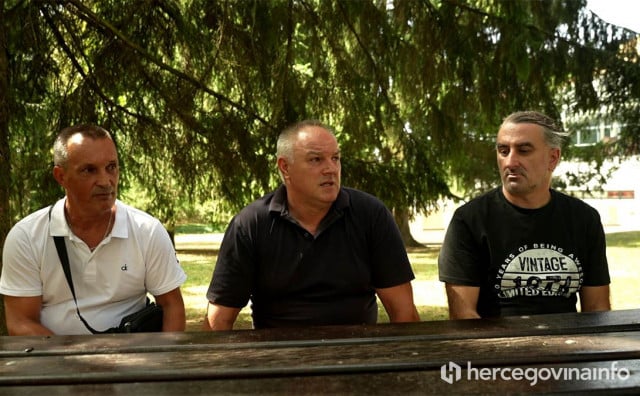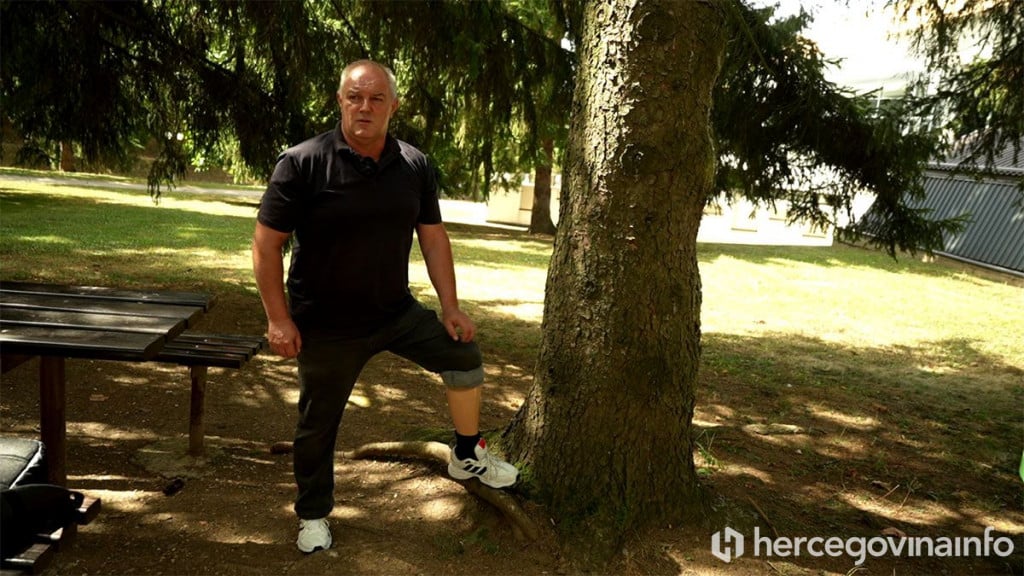SCARS Spasoje, Mirko, and Asim Teach Youth the Futility of War

A Serb, a Croat and a Bosniak are sitting together and telling jokes about the past war. And all three were in it, on three different sides, each within their own national corps.
Getting to know each other, as one of them says, was not through gun sight. And each of them says, they defended their houses and families.
Spasoje Kulaga from Derventa was briefly in the Army of the Republic of Srpska, right at the beginning of the war in Bosnia and Herzegovina. In March 1992, he celebrated his 23rd birthday on the front line.
"My identities have changed over time, as we veterans measure time before the war and after the war. Until 1992, Spasoje was an athlete, a secondary school student, a worker, a neighbor, a friend and a brother. At the beginning of the 1992 war in Derventa, I, like many at that time, joined the ethnic group to which I belong - the Serbs, entered the Army of the Republic of Srpska as a young man," says Spasoje, whose war journey lasted a few months, but enough to leave an indelible mark.
“I fought that spring and summer. In the battles near Derventa in the summer of 1992, I was seriously wounded. During those combat operations near Derventa, I stepped on an anti-personnel mine and as a result of that explosion, after treatment, my left lower leg was amputated," says Spasoje for our "Scars" series.
According to him, from that moment on, his identities and life views began to change. The rehabilitation, which lasted for a year, also brought new challenges - how to return to normal life courses.

Spasoje Kulaga, former member of the RS Army
"I was in a position where I had to learn to walk again, because I couldn't function, I lost one lower extremity. It had to start again, that is, to function. I was learning how to bring myself a glass of water and a plate of soup when I took off that orthopedic aid I was given. You should have seen me later, when I got married and had a family of my own and children, I learned to take care of those children because I could never run after my child," says Spasoje.
Some 100 kilometers away from Derventa, Mirko Tadić Zečević met the war as a minor in Brčko.
"The war itself, I won't say that it took me by surprise. We live close to Vukovar, which is about 80 kilometers from us, so I had been listening to detonations for a couple of months before that. I was 17 and a half years old. In addition to the fact that I was somehow aware that there would be a war, I did not realize that it was something so pernicious, so dangerous. I thought it would be quick, it would pass shortly if there were any conflicts. When the conflicts started in our country near Brcko and when I saw that the months were passing by, I saw that it was not at all harmless, that it was already going to extremes, that you could die every second, as well as your closest ones," says Mirko.
Unlike Spasoja, Mirko's war journey lasted longer, but ended in an identical way. During night observation and reconnaissance, he entered a minefield.
"I came to the edge of a forest. I ran across the road, jumped over the canal and took about 7-8 steps, through some grass and hedges, which were already overgrown there, and at some point, I stepped on an anti-personnel landmine, the so-called pâté mine. She threw me maybe half a meter in the air, and I fell down to the ground. I was lucky that I didn't fall on the other landmine, which was nearby, a meter away," says Mirko.
He adds that already at that moment, while he was on the stretcher, he told his war comrades that the war was over for him.
During that time, Asim Parlić, a former YNA officer who served in Priština before the war, was still on military duty in the vicinity of Zavidovići, and after the war in Bosnia and Herzegovina began, he returned to his home and joined the newly formed Army of Bosnia and Herzegovina.
Unlike Spasoja and Mirko, Asim, fortunately, did not have a "close encounter with a mine", but the war left lasting consequences on him as well.
"One grenade fell in front of me about 3 to 4 meters away, and the three couriers were about 5-6 meters away from me. She wounded three of them very badly, but all three survived. It's also interesting to me, since I'm a soldier and I know the picture of falling shells scattering, I was only thrown on my back by the detonation of that shell, so that none of the shrapnel, which was incomprehensible to me, caught me. And that moment remained etched in my memory," says Asim.
However, another event caused him much more serious consequences.
"It happened to me in 1993, during the conflict with the HVO and the Army of Republic of Srpska, that after withdrawing from the position where I was in a place just above the city, I could not sleep for 4 days and 4 nights. So, the dream was absolutely eluding me and I sought professional help. It wasn't until I received the cocktail of injections that I fell asleep. A very difficult and traumatic experience, among other things, on the basis of that, I retired in 1997", says Parlić.
Asim Parlić, former officer of the BiH Army
Today, 30 years later, Asim, together with Spasoja and Mirko, participates in the activities of the Association for the support of war veterans, families and victims of the war in Bosnia and Herzegovina "Real Fire".
They mostly work with young people, veterans, women and other categories of the population who in some way are either victims or have consequences from the war.
Among other things, one of the activities are workshops with young people, where they talk about war experiences and horrors.
"Even today, we often remember those moments when we were burying our friends who died in the war, and their family and their children were looking at us at that moment. Those looks of those people when you carry their father, husband, son, to the grave and they know that they will never see him again, and you are someone who at that moment, perhaps, was lucky to survive and that at that moment you also carry that burden, some kind of guilt, because you are alive," says Spasoje.
Through the work of the association and lectures, Spasoje, together with his colleagues, often points out that it is necessary to work on mistakes and correct them, so as not to enter into that kind of spiral again, which could again lead to any conflicts.
Mirko Tadić notes that we should work especially with young people, present them with positive things, with the message that conflict is out of the question.
Mirko Tadić Zečević, former member of the HVO
"I just hope that through those 3-4 years of war, we realized that we simply cannot go to that extreme anymore. I cannot force a person who is not a Catholic, a Croat or whatever, to leave me, because we are so mixed that it is an impossible mission, that we would have to create 15,000 small states within the scope of Bosnia and Herzegovina so that everyone can have their own peace, or some corner of his own, says Mirko for Gerila.
Asim Parlić thinks similarly, with the message that everyone suffered in the past war.
"If we look at those human losses, what people suffered in that war, that war really didn't bring anything good to anyone. The area that was agreed upon in Dayton, the Republic of Srpska, or the Federation, or the Brčko District, that's still the deal. The deal is Bosnia and Herzegovina, we live in this area and will continue to live in this area, we cannot fight against each other and only together can we build our future and a happier tomorrow", notes Parlić.
According to him, relations need to be relaxed in this country and this is one of the key reasons why he works with war veterans because they are honest people, regardless of which formation or army they belong to.
Vezani članci
